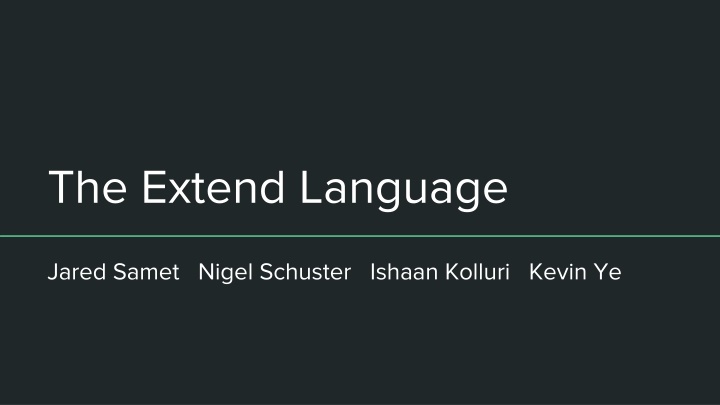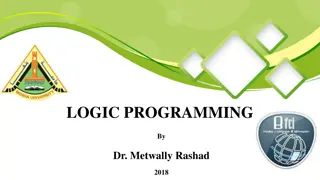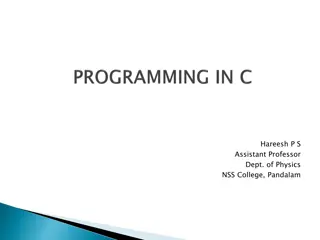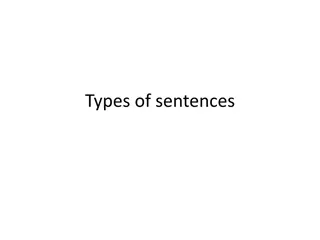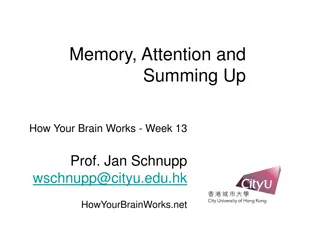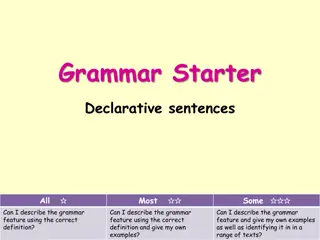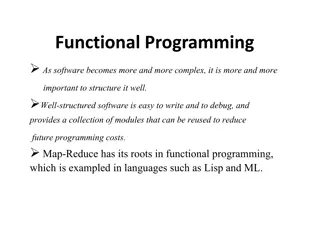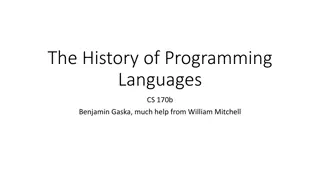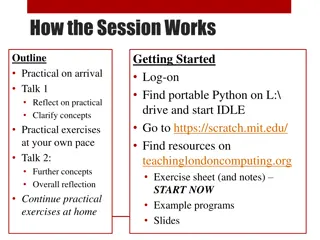The Extend Language
Unveil the Extend language, inspired by the restrictions of spreadsheets, offering a declarative programming approach for reusability. Dive into its basic architecture, lazy evaluation of values, variables handling, and syntax for list comprehensions. Discover its current project status, spanning over 2500 lines of OCaml and 1400 lines of C code on GitHub.
Uploaded on Sep 09, 2024 | 3 Views
Download Presentation

Please find below an Image/Link to download the presentation.
The content on the website is provided AS IS for your information and personal use only. It may not be sold, licensed, or shared on other websites without obtaining consent from the author.If you encounter any issues during the download, it is possible that the publisher has removed the file from their server.
You are allowed to download the files provided on this website for personal or commercial use, subject to the condition that they are used lawfully. All files are the property of their respective owners.
The content on the website is provided AS IS for your information and personal use only. It may not be sold, licensed, or shared on other websites without obtaining consent from the author.
E N D
Presentation Transcript
The Extend Language Jared Samet Nigel Schuster Ishaan Kolluri Kevin Ye
Introduction & Motivation Inspired by limitations of spreadsheets as a language Reusability vs. copy-pasting a block of cells Declarative programming language Reusable Extend Code Cells can contain composite as well as primitive data types normalize([m,n] arg) { [m,n] squared_lengths := #arg * #arg, normalized := #arg / vector_norm; vector_norm := sqrt(sum(squared_lengths)); return normalized; } main(args) { v1 := {3,3,3,3}, v2 := {4,4}, v3 := append(v1, v2); return print_endline(normalize(v1)) -> print_endline(normalize(v3)) -> 0; } {0.500000, 0.500000, 0.500000, 0.500000} {0.363803, 0.363803, 0.363803, 0.363803, 0.485071, 0.485071}
Extends Current Project Status ~2500 lines of OCaml Code ~1400 lines of C Code ~800 commits on GitHub 125 regression test cases
The Basic Architecture 1. Scanner Extend contains code in C to define and instantiate variables at runtime, along with their contents and respective scopes. 2.Parser 3. AST 4. Transformer 5.Semantic Analysis 6.Code Generation 7. Linking 8.Success!
Variables in Extend Contains cells, which contain a formula that evaluates to a number, string, empty , or a range type. Value of a cell is calculated only once according to the assigned formula, and never if it is never referred to. You cannot apply multiple formulae to a single cell! NOT a data type, but a collection of cells with assigned formulae A Range is a value, implemented as a pointer to a subset of a variable s cells. Always composed of more than one value, unlike a variable, which can be one. There is a variable backing a range; can be explicitly defined or anonymous(range literals)
Lazy Evaluation of Values maybeCircular(truth_value) { x := x; return truth_value ? x : 0; } main(args) { foo := print_endline("To be or not to be?") -> print_endline("Enter \"Not to be\" to attempt to evaluate a circular reference.") -> readline(STDIN); return maybeCircular(foo == "Not to be" || foo == "\"Not to be\"") -> print_endline("Good thing I didn't look at the value of x."); }
Syntax makes list comprehensions easy splitChars([1,n] stringchars, splitchar) { loc := matchRow(stringchars, splitchar); firstword := fromASCII(stringchars[:loc]); lastwords := splitChars(stringchars[loc+1:],splitchar); combined := stack(firstword, lastwords); return loc == empty ? fromASCII(stringchars) : combined; } split(string, splitter) { return splitChars(toASCII(string), toASCII(splitter)); } splitToRange(string, row_splitter, col_splitter) { split_rows := split(string, row_splitter); [numRows(split_rows),1] split_cols := split(#split_rows,col_splitter); [numRows(split_rows),1] col_lengths := numRows(#split_cols); [numRows(split_rows), max(col_lengths)] result := #split_cols[column()]; return result; } main(args) { tokenize_me := "1,2,3\n12,15,18,20,42\nishaan,jared,kevin,nigel"; return print_endline(splitToRange(tokenize_me, "\n", ",")); }
Syntax makes list comprehensions easy splitChars([1,n] stringchars, splitchar) { loc := matchRow(stringchars, splitchar); firstword := fromASCII(stringchars[:loc]); lastwords := splitChars(stringchars[loc+1:],splitchar); combined := stack(firstword, lastwords); return loc == empty ? fromASCII(stringchars) : combined; } split(string, splitter) { return splitChars(toASCII(string), toASCII(splitter)); } splitToRange(string, row_splitter, col_splitter) { split_rows := split(string, row_splitter); [numRows(split_rows),1] split_cols := split(#split_rows,col_splitter); [numRows(split_rows),1] col_lengths := numRows(#split_cols); [numRows(split_rows), max(col_lengths)] result := #split_cols[column()]; return result; } Recursively tokenizes the range of chars split_rows: {tok_a;tok_b} // Strings split_cols: {{tok_a1;tok_a2};{tok_b1;tok_b2,tok_b3}} // Ranges col_lengths: {2,3} // Numbers result: {tok_a1, tok_a2; tok_b1, tok_b2} // Strings fromASCII, toASCII are the only functions not implemented in-language; needed to split the atom since String is an atomic type in Extend.
Transformations Part 1 - Simplifying the LHS Extend allows you to write: [3+4, f(x,y)] foo; By turning it into: _tmp_foo_rows := 3+4; _tmp_foo_cols := f(x,y); Similar transformation for: foo[q+r, g(w):h(z)] = 42; That becomes: _tmp_startrow := q+r; _tmp_startcol := g(w); _tmp_endcol := h(z); foo[_tmp_startrow, _tmp_startcol:_tmp_endcol] = 42;
Transformations Part 2 - Conditionals Consistent short-circuiting everywhere foo && bar ===> truthy(foo) ? truthy(bar) : 0; foo || bar ===> truthy(foo) ? 1 : truthy(bar); switch (x) {case a: ex1; case b, c: ex2; default: ex3} ===> (x == a ? ex1 : (x == b || x == c ? ex2 : ex3)) switch {case d: ex4; case f, g: ex5; default: ex6} ===> d ? ex4 : (b || c ? ex5 : ex6) Much smaller set of cases for code gen, but lots of internal variables
Transformations Part 3 - Return val, size asserts foo([m,n] arg1, [m,1] args) { return m+n; } _tmp_size_1 := size(arg1); _tmp_size_2 := size(arg2); m := _tmp_size_1[0]; n := _tmp_size_2[1]; _assert := 1 && (m == _tmp_size_2[0]) && (1 == _tmp_size_2[1]); // the initial 1 is base case for List.fold_left _ret_val := m+n;
Extend Runtime Some values must be determined at runtime: [x, f(y)] foo; Achieved by keeping a blueprint around, but only instantiating if necessary [x, f(y)] foo; return 2<3 ? 0 : foo; Does not do computation until necessary: [2,1] foo := column() == 0 ? easy() : expensive(); Return foo[0,0];
Function Pointers All The Way Down Each variable (both user defined and transformation-generated) gets one of these; one instance of this struct per program, not per function struct var_defn { int rows_varnum, cols_varnum; int numFormulas; struct ExtendFormula *formulas; char isOneByOne; // true for the transformation-generated LHS vars char *name; // used to make user-friendly runtime errors };
Function Pointers All The Way Down One per program - essentially a class definition One per function call - essentially an object struct var_defn { int rows_varnum, cols_varnum; int numFormulas; struct ExtendFormula *formulas; char isOneByOne; char *name; }; struct var_instance { int rows, cols; int numFormulas; struct ResolvedFormula *formulas; struct ExtendScope *closure; value_p *values; char *status; char *name; }; Closure = the other local variables and the function parameters
Function Pointers All The Way Down Each formula gets one of these; one instance per program typedef value_p (*FormulaFP) (struct ExtendScope *scope, int row, int col); struct ExtendFormula { char fromFirstRow; int rowStart_varnum; char toLastRow; int rowEnd_varnum; char isSingleRow; char fromFirstCol; int colStart_varnum; char toLastCol; int colEnd_varnum; char isSingleCol; FormulaFP formula; };
Function Pointers All The Way Down One per var instance One per program struct ResolvedFormula { int rowStart, rowEnd; int colStart, colEnd; FormulaFP formula; }; struct ExtendFormula { char fromFirstRow; int rowStart_varnum; char toLastRow; int rowEnd_varnum; char isSingleRow; char fromFirstCol; int colStart_varnum; char toLastCol; int colEnd_varnum; char isSingleCol; FormulaFP formula; }; typedef value_p (*FormulaFP)(struct ExtendScope *scope, int r, int c); struct ExtendScope { struct var_defn *defns; // Class struct var_instance **vars; Object int numVars; int refcount; value_p *functionParams; };
Demo & Elaborations The True Shooting % program as an application of Extend to a spreadsheet use case. Analytic used to measure shooting efficiency of NBA players Reads data from input file into variable Using that data, it calculates the tsp for every player This is an example of an industry use case of Extend
Team Responsibilities Jared Samet: Language design, code generation, semantic analysis, transformations Nigel Schuster: software architecture, building, code generation, runtime Ishaan Kolluri: documentation, standard library, regression tests Kevin Ye: scanner, standard library, regression tests
Reflections Testing is paramount Testing exposes what features you have yet to do, and provides you with direction A comprehensive regression test suite increases the probability that a new feature will integrate properly Use version control to its utmost potential Continuous Integration and Pull Requests keep us accountable Open communication is key Never be afraid to ask for help Use online mediums to ask questions (Github, Group Chat)
